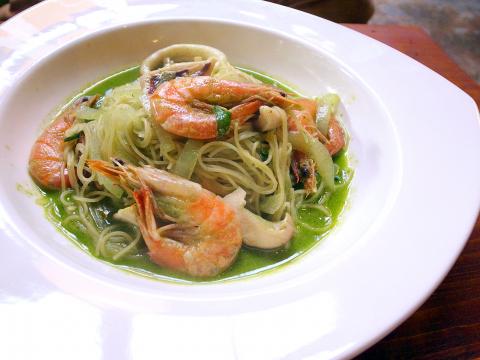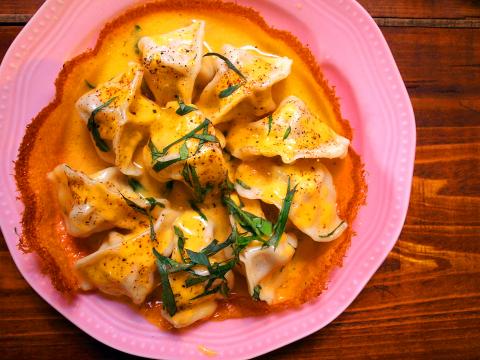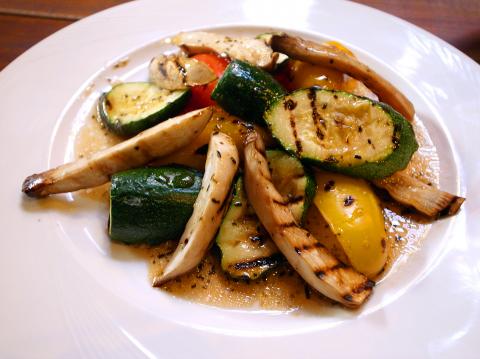For those who enjoy celebrity restaurants like Jay Chou’s (周杰倫) fantastical Deja Vu, Chang Hui-mei’s (A-mei, 張惠妹) place may look a bit plain.
At the A8 Cafe & Gallery, the menu is rustic, with much of it hailing from her hometown Puyuma village of Tamalakaw in Taitung County.
Stylistically, the restaurant is a hipster’s dream. An eclectic design ethos expressed in black iron, exposed cement, red brick and solid wood create a chic vibe. Usually, a restaurant where great care is taken over style can appear neurotically absorbed in its own trendiness. But with A8, high-end elements are balanced by little knickknacks and vintage furniture, which are said to come from the owner’s personal collection. The skull rings on the table and the wall painting of horse anatomy may not be to everyone’s taste, but the space is welcoming, as if it belongs to a really cool person who invited you in to relax, have a good time with friends or be restfully alone.

Photo: Ho Yi, Taipei Times
Children will definitely adore the menu’s golden fried dumplings (黃金煎餃, NT$200 for 10 and NT$250 for 15), which have a sweet corn and pork stuffing and are sprinkled with cheddar cheese and served on a crispy sheet made with more cheese. A local spin on French fries, the fried taro (炸芋條, NT$100) has an al-dente texture and uses the root vegetable grown in the Puyuma diva’s hometown.
The cafe offers a selection of pasta dishes, but the A8 spaghetti with garlic and chili (A8雀兒蒜味辣椒義大利麵, NT$250) my dining companions and I ordered last month was rather generic.
On the other hand, we loved our rainbow mix veggies (彩虹蔬菜, NT$250), which is a bowl of red and yellow bell peppers, zucchini and king oyster mushrooms brought to life by excitingly tangy mustard seeds.

Photo: Ho Yi, Taipei Times
My favorite part of the menu, however, was the home-style Tamalakaw dishes. Light-flavored and cooked with simple ingredients, the Puyuma loofah noodle soup (普悠瑪瓜瓜麵, NT$200) immediately brings a soothing sensation not unlike the warm, nourishing food your mother made for you when you were sick and needed to be pampered as a child.
The wait staff, many of whom hail from the Puyuma tribe, seem amicable and at ease and help to create a homey feel to the dining establishment. Below the restaurant, an art gallery holds exhibitions from time to time. Currently on display are oil paintings created by artists with disabilities
A8 also boasts a popular selection of desserts, including red-wine rose ice cream (紅酒玫瑰冰淇淋, NT$180) and waffles with apple, orange or mulberry jelly (A8自製果醬鬆餅, NT$220) that’s made in-house.

Photo: Ho Yi, Taipei Times
There are few choices of beer (NT$180 and NT$200) from the Netherlands and Germany, as well as a small collection of cocktails (NT$200 and NT$250) and wine (NT$1,250 and NT$1,500 per bottle, NT$250 and NT$280 per glass). A8’s signature drink is coffee made from beans grown and harvested in Tamalakaw. Its name, Haliwanes (哈莉瓦嫩思, NT$220), means rainbow in the Puyuma language.

April 14 to April 20 In March 1947, Sising Katadrepan urged the government to drop the “high mountain people” (高山族) designation for Indigenous Taiwanese and refer to them as “Taiwan people” (台灣族). He considered the term derogatory, arguing that it made them sound like animals. The Taiwan Provincial Government agreed to stop using the term, stating that Indigenous Taiwanese suffered all sorts of discrimination and oppression under the Japanese and were forced to live in the mountains as outsiders to society. Now, under the new regime, they would be seen as equals, thus they should be henceforth

Last week, the the National Immigration Agency (NIA) told the legislature that more than 10,000 naturalized Taiwanese citizens from the People’s Republic of China (PRC) risked having their citizenship revoked if they failed to provide proof that they had renounced their Chinese household registration within the next three months. Renunciation is required under the Act Governing Relations Between the People of the Taiwan Area and the Mainland Area (臺灣地區與大陸地區人民關係條例), as amended in 2004, though it was only a legal requirement after 2000. Prior to that, it had been only an administrative requirement since the Nationality Act (國籍法) was established in

Three big changes have transformed the landscape of Taiwan’s local patronage factions: Increasing Democratic Progressive Party (DPP) involvement, rising new factions and the Chinese Nationalist Party’s (KMT) significantly weakened control. GREEN FACTIONS It is said that “south of the Zhuoshui River (濁水溪), there is no blue-green divide,” meaning that from Yunlin County south there is no difference between KMT and DPP politicians. This is not always true, but there is more than a grain of truth to it. Traditionally, DPP factions are viewed as national entities, with their primary function to secure plum positions in the party and government. This is not unusual

US President Donald Trump’s bid to take back control of the Panama Canal has put his counterpart Jose Raul Mulino in a difficult position and revived fears in the Central American country that US military bases will return. After Trump vowed to reclaim the interoceanic waterway from Chinese influence, US Defense Secretary Pete Hegseth signed an agreement with the Mulino administration last week for the US to deploy troops in areas adjacent to the canal. For more than two decades, after handing over control of the strategically vital waterway to Panama in 1999 and dismantling the bases that protected it, Washington has